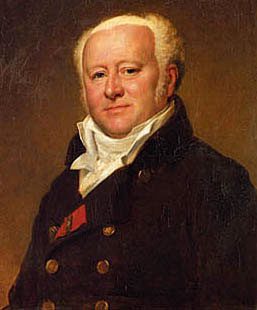
François-Pascal-Simon Gérard, 1806
Oil on fabric
Château de Versailles, France
An outstanding diagnostician and pioneer in cardiology, Jean Nicolas Corvisart de Marets has been called the founder of French clinical medicine. He advocated the careful clinical examination of the heart, described syndromes and signs of heart disease that to this day still bear his name, and popularized percussion of the chest as a diagnostic tool, translating from Latin into French the original manuscript of Leopold von Auenbrugger. In 1806 he published the first book on diseases of the heart and great blood vessels. Said to have accomplished as much for the heart as his pupil Laënnec did for the lungs, he is also remembered for being the personal physician of Napoleon Bonaparte.
His career began inauspiciously. A pupil of mediocre attainment, he played truant whenever he could, devoting himself mainly to sports and reportedly leaving school almost as ignorant as he went in. He disappointed and displeased his father, who had wanted him to become a lawyer and turned him out of the house when he refused to obey. Moving to Paris, he became fascinated with medicine, enrolled in the faculty of medicine, and worked as a male nurse to pay for his tuition. He was industrious and well-liked, and met some of the great physicians of the time. He prepared cadavers for autopsies, and once developed a severe infection from a cut sustained in the course of his work. Graduating first in his class in 1782-5, he was recommended for a position at the newly founded Necker Hospital, but was not appointed because he refused to wear a powdered wig.
Instead he took a position in a hospital for the indigents. There he continued his professional development, studying, teaching clinical medicine, carrying out autopsies, and always correlating the findings observed during life with those found at autopsy. He changed the format of the hospital teaching grounds by conducting them in the ceremonial way done in Vienna, marching at the head of his students as if leading an army. By 1788 he had become the chief of the hospital, was appointed professor of pathology and physiology.
During the terror days of the French Revolution, Corvisart lay low, for this was a difficult time when all teaching institutions were dissolved and anybody was allowed to practice medicine. When order was restored and medical education reorganized, he was recruited to teach clinical medicine, and in 1797 became professor of medicine at the prestigious College of France. He continued to study the diseases of the heart and in 1806 published his famous treatise on cardiac diseases. He made many advances and clinical observations, clearly distinguishing between the symptoms of heart and lung disease. As professor he taught many famous pupils and successors, such as Bichat, Bretonneau, Laënnec, Cruveilhier, and Rayer. At the age of sixty he retired, believing that physicians were of little use after that age. He lived until 1821, when he died of apoplexy.
In July 1801 Corvisart met Napoleon Bonaparte, known to be skeptical of medicine and suspicious of doctors. Corvisart gained Napoleon’s confidence by his quiet and decisive manner, leading the emperor to declare that he did not believe in medicine but believed in Corvisart. As Napoleon’s primary physician, he accompanied him on several campaigns, attending to his personal health and that of the Empresses Josephine and Marie-Louise. Corvisart also had an appointment as France’s chief physician, in charge of preventing contagious illnesses and functioning as the country’s secretary of health. In that capacity he introduced reforms on medical education, medical practice, and the preparation and sale of medicines. For his achievements he occupies a special place in the history of medicine, remembered as a great clinician and teacher, an innovator and role model for an entire generation of physicians.
References
- Halls Dally, JF. Life and times of Jean- Nicolas Corvisart. Proc Roy Soc. Med. 1941;34:23-246
- Karamanou M, et al. Professor Jean-Nicolas Corvisart des Marets: Founder of Modern Cardiology. Helenic Journal of Cardiology. 2010;51:290-293.
- Cantwell JD. Jean-Nicolas Corvisart. Clin Cardiol; 1988;11:801-803.

Leave a Reply